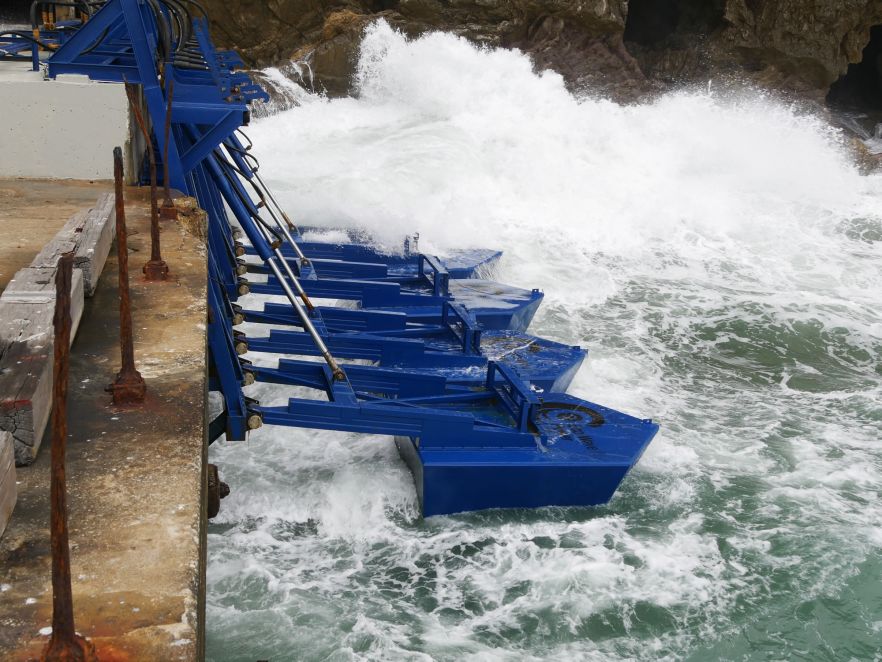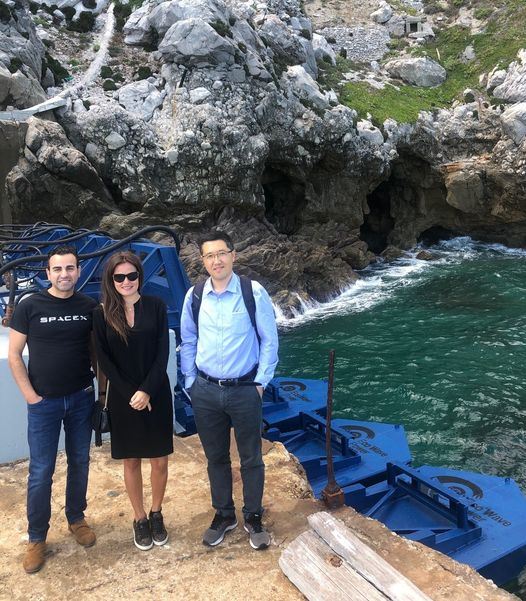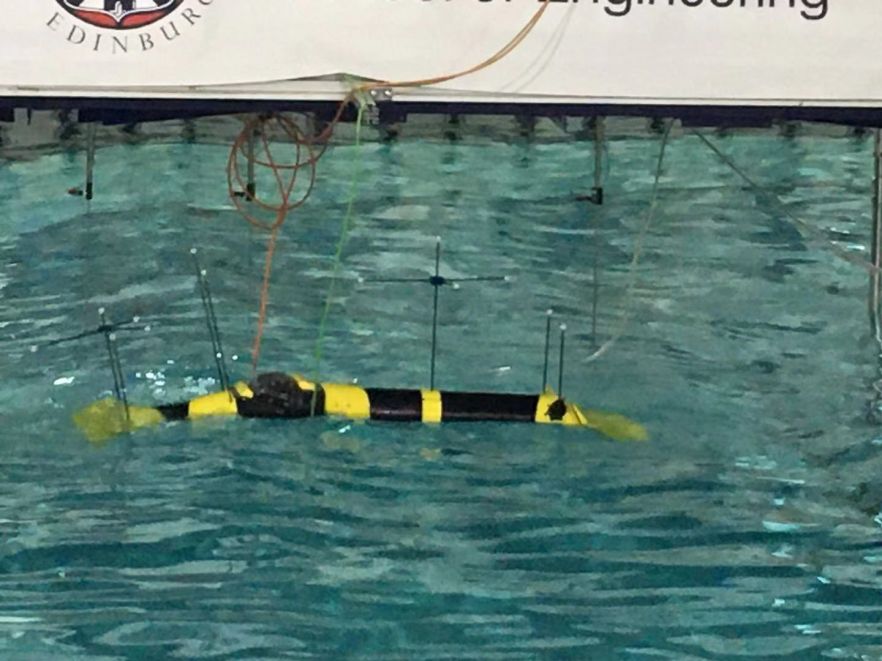Control Systems Group: News
News: Sea wave energy to power remote islands and rural coasts
Our new project on "Sea Wave Energy Powered Microgrid for Remote Islands and Rural Coasts" has been awarded by Innovate UK (Energy Catalyst round 8: clean energy access, feasibility projects). In this project, our QMUL team (led by Dr Guang Li and Dr Kamyar Mehran) will work with Eco Wave Power (EWP) Ltd. to conduct feasibility study of using sea wave energy technology to provide clean electricity to remote islands and rural coast areas which have no or limited access to national grid. The project will consider the possibility to establish a stand-alone micro grid powered by onshore wave energy converters (WECs) developed by EWP. Building large-scale offshore wave energy farms connecting with national grids is still in early stages due to the high Levelized cost of energy (LCOE). This project, instead, aims to develop a resilient, highly efficient, standalone MG powered by a small array of onshore WECs to make wave energy economically viable with minimum maintenance and autonomous power management. With the active participation of our industrial partner, EcoWavePower (EWP) in the SE Asia region, and Asian Institute of Technology (AIT) acting as tech transfer hub, the research outputs can be easily transferred to other regions with similar situations. (25/June/2021)
The News related to this project by QMUL press is here:

The onshore wave energy converters in operation at Gibraltar wave energy station (picture provided by EWP).
News: WOHL award to support our collaboration with Eco Wave Power
We are awarded the WOHL Clean Growth Alliance Grant to support our collaboration with Eco Wave Power Ltd. The project is titled "Improved performance of onshore wave energy converters by control". Eco Wave Power (EWP) based in Israel has pioneered an innovative design of an onshore wave energy converter (WEC) and is pioneering the wave energy field operating the only grid-connected onshore WEC array in the world, in accordance with a Power Purchase Agreement, since 2016 in Gibraltar. The Company is currently finalizing its second grid-connected array in Israel. This project will enable the two teams from Queen Mary and EWP with complementary expertise in WEC design and control to initiate collaborations on control system design for EWP’s WECs to further significantly improve their performance towards commercial roll-out. 26/June/2021.

EWP power station visited by Dr Guang Li and Dr Kamyar Mehran at Gibraltar wave power station.
From left to right: Kamyar Mehran, Inna Braverman (EWP founder) and Guang Li.
News: Our First Wave Energy Converter Control Testing at FloWave
We have completed our first tank testing of our non-causal optimal control of a wave energy converter (WEC) at FloWave tank testing facility of Edinburgh University. The WEC device is an attenuator type device developed by Mocean Energy Ltd. This is the part of the Stage 3 Control project sponsored by Wave Energy Scotland (WES). The tank testing results show that the energy output can be significantly improved by our non-casual optimal control algorithm. We find that the wave prediction information plays a key role in improving the energy capturing efficiency of the WEC. We used deterministic sea wave prediction (DSWP) technique to provide the wave prediction information to the non-causal optimal controller. 15/April/2021
News: Control of Large Capacity Wave Energy Converters
We are awarded a 3-year £986K project on “System-level Co-design and Control of Large Capacity Wave Energy Converters with Multiple PTOs”. The team involves the partner universities University of Manchester and University of Exeter and several industrial partners. Marine wave energy is still less mature than wind, with perceived higher levelized cost of energy (LCOE). Various commercial initiatives have unfortunately failed and there is no convergence of design concept for waves as there is for wind and marine turbines. The overarching vision for this project is to develop a unified systematic platform based on whole system optimal control, design and control-operational techniques for reducing annualised LCOE by tackling the key technical issues commonly shared by most wave energy converter (WEC) types, especially targeting the promising high capacity multi-float multi-PTO WECs. This will be achieved through low-risk extraction of wave energy, efficient electricity generation and electrical power conditioning. With the goal being the lowest annualised LCOE taking account of power quality, the project outcomes will provide a step change in enabling the viability of wave energy. The project will foster the convergence of the WEC technologies by addressing the fundamental open question: what is the optimal trade-off between the complexities of device design, controller design with de-risked operation delivering the lowest achievable LCOE with improved power quality and availability?
News: Stage 3 Control Project Awarded by Wave Energy Scotland
We are awarded Stage 3 Control Project by Wave Energy Scotland to experimentally validate the efficacy of our proposed "Adaptive Hierarchical Model Predictive Control Framework" developed in our Stage 1 and Stage 2 projects. The total cost is £461,345 (ex VAT). Please click here for more details.
News: Marie-Curie Individual Fellowship Awarded to Control Systems Group
The 225K Euro project on "Hierarchical optimal energy management of electric vehicles" will last for 2 years in our Control Systems Group.
It has been widely recognized that vehicle electrification provides a potential way for us to move towards a more decarbonized transport system and sustainable circular economy. The overarching objective of this project is to develop a novel computationally efficient hierarchical adaptive optimal control framework incorporating transportation information and drivers’ habits suitable for energy management of multi-source EVs.
News: A PhD studentship is available on advanced optimal control and its applications
A full-time PhD studentship is available in control group. In this project the student will develop a novel control framework for sustainable systems with embedded energy storage elements. The control framework will have multiple control tasks: 1) maximise energy conversion efficiency from energy sources to electricity, 2) improve electricity quality through energy storage power management, and 3) guarantee safe operation of the whole system. The student is expected to have a strong background in automatic control, dynamics modelling or relevant engineering areas. Please apply as soon as you can if you are interested in this studentship. Email: g.li@qmul.ac.uk.
News: Welcome new PhD student Mr Salman Qadir and academic visitor Prof Zheng Chen in our group
Mr Salman Qadir from Pakistan is sponsored by HEC from Pakistan joined our group as a PhD student. Prof Zheng Chen from Kunming University of Science and Technology will be visiting our group for one year.
News: Our group wins 2nd Stage wave energy converter control project
Our group's proposed control project has been selected by Wave Energy Scotland as one of 3 projects that will be developed further. The 3 successful projects were selected among 13 projects at Stage 1. The project aims to develop reliable and efficient control strategies to improve the wave energy converter conversion efficiency and survivability over a wide range of sea states, in collaboration with Mocean Energy Ltd and Exeter University. The total award is worth £151,304. More information can be foundhere
News: PhD studentship sponsored by CSC
Our group is seeking a suitable candidate to apply for the China Scholarship Council (CSC) sponsored scholarship for entry in September 2018. Under the scheme, Queen Mary will provide scholarships to cover all tuition fees, whilst the CSC will provide living expenses and one return flight ticket to successful applicants. The research will be on control engineering and control applications. If you are interested in this scholarship, please send your application as soon as possible before the end of January 2018. The announcement of the scholarship together with the online application method is provided in the following link: https://www.sems.qmul.ac.uk/research/studentships/284/sems-china-scholarship-council-csc-phd-studentships-for-entry-in-september-2018 If you want an informal enquiry, please feel free to send your email to g.li@qmul.ac.uk
News: Adaptive hierarchical model predictive control of wave energy converters
We were just selected as one of the 13 project teams by Wave Energy Scotland to work on Control System Design of wave energy converters. Project description: This project proposes a hierarchical adaptive optimal control framework to maximise wave energy conversion efficiency while guaranteeing safe operation for a large range of sea states. The framework combines the strengths of several key promising technologies in control and wave prediction to adaptively achieve the best trade-off between energy maximisation and survivability. Our project partners include University of Exeter and Mocean Energy Ltd.
News: Welcome new members Mr Muhammad Sajjad Sabir Malik and Mr Zhijing Liao as PhD students in our group
Mr Muhammad Sajjad Sabir Malik from Pakistan sponsored by and Mr Zhijing Liao from Beijing Institute of Technology joined our group as PhD students.
Vacancy: A 3-year Postdoctoral Research Position is available (The expected starting date is July 2017)
The postdoctoral researcher will work on an EPSRC funded project on Control of Launch and Recovery in Enhanced Sea-States. Important examples of these operations are the launch and recovery from a mother-ship of small craft, manned and unmanned air vehicles and submersibles. The proposed work is closely coupled to two already funded EPSRC projects under the Launch and Recovery Co-Creation Initiative. This EPSRC funded post is available from 1 July 2017 for 3 years. The successful applicant will be responsible for delivering new fundamental operations and control research and providing the basis for the creation of a real-time decision support system for vessel operators responsible for Launch and Recovery at sea. The practical driver is to extend the range of sea-states in which existing wave limited maritime operations can be safely carried out. Important examples of these operations are launch and recovery (L&R) from a mother-ship of small craft, manned and unmanned air vehicles and submersibles. Currently many marine operations, such as L&R of small craft, manned and unmanned air vehicles and submersibles from a mother ship, can only be attempted in sufficiently calm sea-states. Although the underlying principles will be relevant for all these operations, this proposal will focus on the recovery of a manned rigid inflatable boat (RIB). In this project the research aim is to develop a novel approach to predicting a suitable time instant at which to initiate a L&R operation, together with a confidence measure (provided as advice to a human operator), and then to control the execution of the subsequent lift operation once initiated using a form of Model Predictive Control (MPC). The successful applicant will possess a relevant PhD or equivalent qualification/experience in a related field of study and will have recognised expertise in the areas of system modelling and control and possess in-depth understanding of this specialism to enable the development of new knowledge and understanding within the field. Applicants will possess proven expertise in the areas of systems modelling and control and highly developed skills in Matlab & Simulink. The successful applicant will 1) develop fast MPC for the L&R process, 2) conduct stability analysis with preview information and varying constraints, 3) conduct co-design to integrate system parameter selection into controller design. For informal enquiries, please contact g.li@qmul.ac.uk
News: Control of Launch and Recovery in Enhanced Sea-States - Part of the Launch and Recovery Co-Creation Initiative
This project is sponsored by EPSRC for three years from July 2017 to July 2020. The project aims to develop a novel approach to predicting a suitable time instant at which to initiate an L&R operation, together with a confidence measure (provided as advice to a human operator), and then to control the execution of the subsequent lift operation once initiated, using a novel form of Model Predictive Control. The research overarching vision is to create the new science that can be exploited to provide the underpinnings of a new generation of high added-value products to upgrade the performance and prolong the service life of existing naval vessels.
News: Royal Society-Newton Advanced Fellowship
Dr Guang Li and his colleague Prof Wei He from University of Science and Technology Beijing (USTB) have been awarded Royal Society-Newton Advanced Fellowship in 2017. The project is on "Control of Floating Wave Energy Converters with Mooring Systems". This project aims to resolve a fundamental control problem for floating wave energy converters (WEC) with mooring lines. The project will be collaboratively conducted by the UK team (lead by Dr Li) with expertise in WEC control and the Chinese team (lead by Prof He) in mooring control. This fellowship is jointly offered under the Newton Fund and NSFC (China), aiming to support early career group leaders in partner countries to develop their research by linking them with some of the best research groups in the UK. The project will last for 3 years. The project will be jointly supported by the Royal Society (providing 111K) and NSFC (providing 500K RMB).
Vacancy: PhD studentship available
A PhD studentship jointly sponsored by Queen Mary and CSC (China Scholarship Council) is available for a student with Chinese citizenship. The successful candidate will work on control systems. The potential applications will be in hot and multidisciplinary areas such as renewable energy, energy storage management and novel dynamic testing methods. If you are interested in this studentship, please feel free to contact me.


